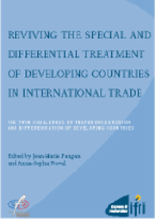Gateway to Think Tanks
| 来源类型 | Publications - Books |
| 规范类型 | 图书 |
| DOI | 2-86592-171-9 |
| Reviving the Special and Differential Treatment of Developing Countries in International Trade: The Twin Challenges of Preference Erosion and Differentiation of Developing Countries Paris : Ifri : AFD, Groupe Agence française de développement, 2006. - 242 p. (Travaux et recherches Ifri) | |
| Jean-Marie PAUGAM, Anne-Sophie NOVEL, (dir.) | |
| 发表日期 | 2006-04-10 |
| 出版年 | 2006 |
| 概述 | Since the inception of the multilateral trading system, optimally articulating international trade liberalization commitments with developing countries’ national economic strategies has been a central debate. The launch of the Doha Development Agenda (DDA) in 2001 installed, in theory, the... |
| 摘要 |
Reviving the Special and Differential Treatment of Developing Countries in International Trade: The Twin Challenges of Preference Erosion and Differentiation of Developing Countries Paris : Ifri : AFD, Groupe Agence française de développement, 2006. - 242 p. (Travaux et recherches Ifri)
 Since the inception of the multilateral trading system, optimally articulating international trade liberalization commitments with developing countries’ national economic strategies has been a central debate. The launch of the Doha Development Agenda (DDA) in 2001 installed, in theory, the trade and development nexus at the very heart of the WTO negotiations. The principle of Special and Differential Treatment (SDT) asserts the need to adapt international trade rules to the specific economic situation of DCs. However, forty years after being developed, the main concepts underlying the traditional approach of SDT in the WTO seem largely exhausted. Based on the notions of “preference” and “non-reciprocity” of trade commitments, the SDT embodies a systemic contradiction within a world trading system built upon the basic principles of “non-discrimination” and “reciprocal commitments”. The stalemate of SDT and market negotiations over the issues of DC differentiation and preference erosion suggest that the system may have reached the bottom of the contradiction, contributing to hold back the prospects of a successful “development round”. Against this backdrop, this volume addresses two key issues in the development dimension of the DDA, and aims at identifying avenues for a way forward in the WTO negotiations. The first issue is the future of non-reciprocal preferences: what kind of trade and development strategies and insurance against adjustment shocks can be proposed to the countries –in particular members of the G90– facing the threat of preference erosion? The second issue relates to DC differentiation: is it possible to craft a newburden-sharing of global trade responsibilities between developed and emerging economies, in particular G20 leaders?
Reviving the Special and Differential Treatment of Developing Countries in International Trade: The Twin Challenges of Preference Erosion and Differentiation of Developing Countries
|
| URL | https://www.ifri.org/en/publications/ouvrages-de-lifri/reviving-special-and-differential-treatment-developing-countries |
| 来源智库 | French Institute of International Relations (France) |
| 引用统计 | |
| 资源类型 | 智库出版物 |
| 条目标识符 | http://119.78.100.153/handle/2XGU8XDN/414810 |
| 推荐引用方式 GB/T 7714 | Jean-Marie PAUGAM, Anne-Sophie NOVEL, . Reviving the Special and Differential Treatment of Developing Countries in International Trade: The Twin Challenges of Preference Erosion and Differentiation of Developing Countries Paris : Ifri : AFD, Groupe Agence française de développement, 2006. - 242 p. (Travaux et recherches Ifri). 2006. |
| 条目包含的文件 | ||||||
| 文件名称/大小 | 资源类型 | 版本类型 | 开放类型 | 使用许可 | ||
| couv_jmp_differentia(20KB) | 智库出版物 | 限制开放 | CC BY-NC-SA |  浏览 | ||
| 2006_reviving_paugam(2269KB) | 智库出版物 | 限制开放 | CC BY-NC-SA | 浏览 | ||
除非特别说明,本系统中所有内容都受版权保护,并保留所有权利。